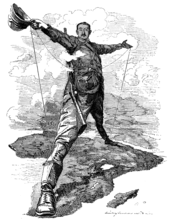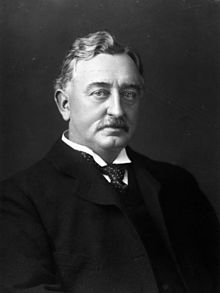Cecil Rhodes
Cecil John Rhodes (born July 5, 1853 in Bishop's Stortford , Hertfordshire , England , † March 26, 1902 in Muizenberg near Cape Town ) was a British businessman and politician .
In the height of imperialism he was one of the leading players in the race for Africa . The colonies acquired by him for the British Empire were named after him Northern Rhodesia and Southern Rhodesia . The latter became the internationally unrecognized state of Rhodesia , now Zimbabwe . Rhodes saw the British as "the first race in the world" and dreamed of a reunification of the Anglo-American world under a common, imperial government.
Life

Cecil Rhodes was the son of Pastor Francis William Rhodes and his wife Louisa, nee Peacock. As a child he suffered from tuberculosis for a long time and was therefore sent to South Africa to live with his brother in 1870 at the age of 17 . On September 1, 1870, he reached Durban . After a short stay with Natal PC Sutherland's chief customs officer and his family in Pietermaritzburg , he went to see his brother Herbert, who had returned to his cotton plantation in the Umkomaas Valley after visiting the diamond mines in Kimberley . After difficulties in the first season, the brothers' subsequent harvests were successful. In May 1871 Herbert Rhodes went to the diamond mines again, where Cecil followed him in October.
Shortly after Cecil Rhodes' arrival at the New Rush (now Kimberley), his brother Herbert went back to the cotton plantation and left the eighteen-year-old alone to monitor his mining field. Among his companions at the time were John X. Merriman and Charles Rudd , with whom he later founded the De Beers company.
In 1872 Cecil Rhodes suffered a minor heart attack. To help him recover, Herbert took his brother on a trip inland, where he believed he could find more gold. The mines near Kimberley continued to be monitored by CD Rudd and her brother Frank, who had recently traveled from England. The journey of the two brothers took them north to what was then Mahikeng and then east through the Transvaal region . Shortly after Herbert's return to Kimberley, the brothers saw each other for the last time before Herbert moved north again. Herbert died in 1879 on Lake Nyasa from a fire in his hut.
In order to achieve a higher education in England, the Rhodes brothers left the mining business to their partner Rudd and drove to England in 1873. There Cecil Rhodes attended Oriel College, but completed only one semester and began his second only in 1876. Another five years later he wrote his final exam. He was now a barrister and a member of the Inner Temple Bar Association in London . It is believed that his long student days were due to doing business in Kimberley and his poor health. In 1877 Rhodes was accepted as a Freemason in the Apollo Lodge in Oxford .
While at Oxford, his business in South Africa continued. Shortly before his return to England, Rhodes and Rudd had moved the mining operations from Kimberley to Vooruitzicht Farm. This was also known as Old De Beers - named after its original owners Johannes Nicolaas and his brother Diederik Arnoldus de Beer, whose traces are lost after the sale of their farm to the diamond miners.
In April 1880, when a number of large mining companies were buying private mines, Rhodes, principal owner, and Rudd formed the De Beers Mining Company with a seed capital of £ 200,000.
In 1881 Rhodes became a member of the Cape Colony Parliament and retained that seat until his death. His political influence increased, and so he was able to induce London in 1885 to conquer Bechuanaland (now Botswana ) by troops stationed in the colony. In February 1887, Rhodes and Charles Rudd founded The Gold Fields of South Africa in London , about a year and a half after the first gold was discovered in what is now Johannesburg . The company bought various gold mines on the Witwatersrand , such as Simmer and Jack , Robinson Deep Mine and Chris Shaft, and grew to a workforce of nearly 100,000 in 1886.
In 1888 Rhodes founded the De Beers Consolidated Diamond Mines with business partners such as Alfred Beit and the Rothschild Bank in Paris , which ultimately achieved a monopoly on diamond production in southern Africa. In 1889 Rhodes received a charter from the British government : he was supposed to found the British South Africa Society (BSAC), which was to promote development from southern Africa. A northern limit of the activities was initially deliberately not defined.
Rhodes managed to bring the independent empires of the Matabele under Lobengula (in present-day Zimbabwe) and the Barotse under Lewanika I (in present-day Zambia) under British rule. The areas were connected to the South Africa Railroad, a stage in the Cape-Cairo line project . Some of the areas administered by this company were sold to English settlers. These new colonies were named Northern and Southern Rhodesia (today's Zambia and Zimbabwe ), named after Rhodes. The company controlled this area until 1923.
In 1890, Rhodes was elected Prime Minister of the Cape Colony. His coalition government relied largely on the Boer African bond with Jan Hendrik Hofmeyr as the decisive figure. During his reign, the conflicts with the Transvaal Republic , in which the Boers dominated, continued. Rhodes' vision was to unite the South African republics and the Cape Colony in one South African union under the British flag. In 1895, Rhodes supported a conspiracy to overthrow Paul Kruger's government in the Transvaal. Leander Jameson , the then administrator of what is now Zimbabwe, led a force that invaded the Transvaal on December 29, 1895 in the so-called Jameson Raid , but failed there.

Rhodes was accused of initiating and assisting this invasion but was acquitted by a committee of inquiry in London. Nevertheless, immediately after the attack became known, he was forced to resign from the office of prime minister. The Boers' confidence in the Cape Colony was irretrievably lost. Rhodes then took care of the construction and further development of Rhodesia and, among other things, pushed ahead with the construction of the railroad (Cape Cairo Plan). Rhodes had little influence on the Second Boer War , which lasted from 1899 to 1902. Rhodes only defended the city of Kimberley, claiming that if he had still been in government he would have prevented this war.
Rhodes died on March 26, 1902. His grave is on a mountain in the Matopo Mountains in present-day Zimbabwe, on the so-called World's View.
Foundations and grants
The diamond and gold business had made him one of the richest men in the world. In his will, he brought a large part of his fortune into his own foundation, which annually awards a Rhodes scholarship to 200 students to attend Oxford University. The idea of such scholarships had been introduced to the English press through the Pan-British Games by John Astley Cooper and was funded by Rhodes.
The Rhodes Foundation still exists today. One of the most prominent scholarship recipients was the future US President Bill Clinton . Around Rhodes and his activities there are hardly substantiated conspiracy theories that go back to the work of Carroll Quigley . In early wills, later set aside, Rhodes dedicated his fortune to the purpose of building a secret society that would accomplish his vision of uniting the Anglo-American world.
On the occasion of the 100th anniversary of the Rhodes Foundation in 2003, the Mandela Rhodes Foundation was brought into being. In addition to former South African President Nelson Mandela , former US President Bill Clinton and then British Prime Minister Tony Blair also took part in the celebrations.
Namesake

- The Rhodes-Livingstone Institute in Lusaka ( Zambia ) was named after him and David Livingstone .
- The Rhodes University in Grahamstown ( South Africa ) bears his name.
Movie and TV
In 1936 the embellished, uncritical film biography Rhodes of Africa was published. Walter Huston played the leading role . With Rhodes , an eight-part television series was produced by the BBC, which was broadcast in 1996. Martin Shaw was seen in the role of Rhodes.
literature
- Apollon B. Davidson: Cecil Rhodes and his time. Protea Book House, Pretoria 2003
- Anthony Thomas: Rhodes: the race for Africa. Penguin Books, London 1997
- Brian Roberts: Cecil Rhodes: Flawed Colossus. Norton, New York 1988
- Hannah Arendt : Elements and origins of total domination. The origins of totalitarianism . Frankfurt / Main 1958, pp. 287 ff., 320-334
Web links
- The Rhodes Trust (English)
- The Rhodes Trust - Information for scholarship applicants from Germany
- Newspaper article about Cecil Rhodes in the 20th century press kit of the ZBW - Leibniz Information Center for Economics .
Footnotes
- ^ Robert I. Rotberg: The Founder. Cecil Rhodes and the Pursuit of Power . Oxford University Press, Oxford / New York 1988, p. 14.
- ^ Roy Macnab: Gold their Touchstone. Jonathan Ball Publishers , 1987, p. 1
- ↑ Find A Grave : Cecil John Rhodes
- ↑ Arnd Krüger (1986): Was John Astley Cooper the inventor of the modern Olympic Games? In: Louis Burgener u. a. (Ed.): Sport und Kultur , Vol. 6. Bern: Lang, 72 - 81.
- ↑ Andreas Bummel : Critical remarks on the basic legend of modern conspiracy theories . In: Telepolis . October 8, 2003
| personal data | |
|---|---|
| SURNAME | Rhodes, Cecil |
| ALTERNATIVE NAMES | Rhodes, Cecil John (full name) |
| BRIEF DESCRIPTION | Founder of the State of Rhodesia |
| DATE OF BIRTH | July 5, 1853 |
| PLACE OF BIRTH | Bishop's Stortford , Hertfordshire , England |
| DATE OF DEATH | March 26, 1902 |
| Place of death | Muizenberg , South Africa |

